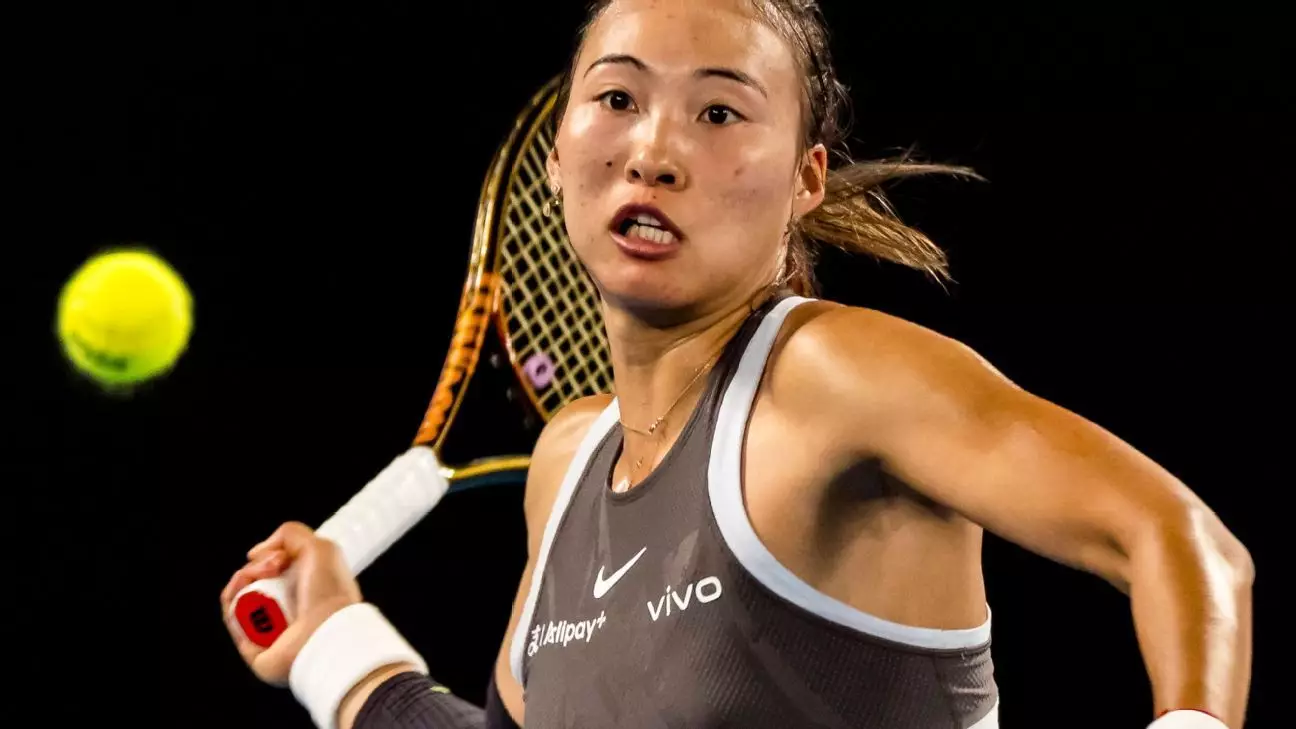As the Australian Open heralds the beginning of a new tennis season, Zheng Qinwen stands not only as a top seed but also as a symbol of perseverance and growth. This year, her journey is markedly distinct compared to where she started just a year ago. With a runner-up finish in 2023 and an Olympic gold medal already to her name, entering Rod Laver Arena invoked nerves, reminiscent of the athlete’s early days in competitive sports. Her experience on the grand stage, though substantial, coupled with the anticipation and emotional weight of the event, brings out both excitement and trepidation. The 22-year-old Chinese star openly expressed her nervousness prior to her first-round match, an all too familiar feeling for many athletes facing the pressure to perform.
Zheng’s psychological landscape serves as a sharp reminder that even accomplished athletes can feel vulnerable. Her performance against Anca Todoni, while yielding a decisive 7-6 (3), 6-1 victory, was not without challenges. Achieving victory despite the internal turmoil is a testament to her mental fortitude. The mental game in sports, particularly in tennis, is frequently understated but plays an integral role in an athlete’s performance.
Entering the tournament as the No. 5 seed, the expectations placed upon Zheng are considerable. Each match becomes a litmus test of not just skills but also of her ability to cope with pressure. It was clear she felt the weight of her aspirations as she navigated the opening set. Her serve, while powerful, faltered as she failed to capitalize on set points, allowing Todoni to gain momentum with opportunities to claim a first set that should have been hers. This instance is emblematic of the tennis journey—where one moment of doubt can shift the course of a match.
Yet, Zheng’s resilience shined through as she conquered her nerves. The second set showcased her prowess as her confidence grew; she dictated the pace and flow of the game against her opponent, displaying the power play style that has become her signature. This evolution, from nervous beginnings to dominating presence, encapsulates her readiness to underlie the stakes of the tournament.
In a season ripe with competitors showcasing their skills, other players, too, are proving their mettle. Aryna Sabalenka, the two-time champion, victoriously commenced her title defense with a commanding performance against Sloane Stephens, a former US Open champion. Their contrasting styles—Sabalenka’s booming shots against the tactical prowess of Stephens—demonstrate the unpredictable yet thrilling essence of the tournament.
In a different matchup, Alexander Zverev, the men’s No. 2 seed, made a notable return with a straight-sets win, further proving that the competition is fierce across both genders. The undercurrents of excitement run deep as veteran players like Kei Nishikori resurface with powerful performances, reminding the younger generation of their formidable presence. Nishikori’s comeback, particularly after battling injuries that sidelined him, resonates with fans and serves as an inspiring narrative for resilience in the sport.
As matches unfolded and tumultuous weather conditions persisted, the indoor setting provided a strategic advantage for players like Zheng. The retractable roof on Rod Laver Arena ensured consistent playing conditions, allowing competitors to focus solely on their game. Players such as Arthur Fils noted the enhanced experience of playing in a controlled environment, free from the interruptions of rain that affected matches elsewhere.
Moreover, the structural format of the tournament that spreads matches over 15 days is integral to player performance. This design allows athletes to manage their physical and mental energy levels better while ensuring an engaging experience for spectators.
New faces, including Hady Habib, are beginning to etch their names into the rich history of the Australian Open. As the first male player from Lebanon to win a match at this prestigious event, Habib’s triumph reflects not only personal achievement but a broader history-making moment for his nation. As he steps forward, the sentiment of pride and inspiration resonates beyond individual success, spotlighting the potential and emerging talents that continually elevate the sport.
The opening day of the Australian Open encapsulated a tapestry of emotions, struggles, and triumphs. From Zheng Qinwen’s path of self-discovery and resilience to the competitive landscape shaped by powerful performances, the tournament sets the stage for an exciting season ahead. As narratives unfold in the coming days, the vibrancy of tennis laced with untold stories of human spirit continues to captivate audiences worldwide.


Leave a Reply